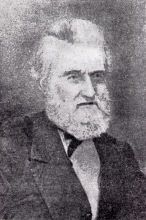The war depletes many Southern Baptist churches of their menfolk. Church officers are not exempt from the male exodus, as exemplified by Jacob Eliot of Corsicana, Texas.
Born in New York in 1803 and raised in Kentucky, at the age of 46 Eliot moved to Navarro County, Texas, with his wife, children, and grandchildren. Purchasing 3,605 acres, Eliot lives the remainder of his life near or in Corsicana, becoming a successful attorney. He also serves as the church clerk of the Corsicana Baptist Church.
When South Carolina had seceded from the Union, Corsicana celebrated by firing anvils (the town had no cannon). During voting for Texas’ second vote for secession, local citizens voted 213 to 3 to leave the United States. On May 11, 1861, a not-too-young Eliot wrote of his commitment to the Confederacy:
Home guard Company met first time to drill. Was drilled by Capt. W. W. McPhail. I am now 57 years old and have not been on drill – until today – since 1836, when I was Quartermaster of a regiment under Col. Morgan in Hardin County, Kentucky.
Eliot noted in his journal in the summer of 1861:
July 4: — We spent most of the day at the church in company with more than 40 ladies, preparing tents and soldiers’ clothes.
July 6: — Finished soldiers’ outfit. Ladies turned out well to help. More than fifty came, some of them for five days.
July 9: — Tuesday — Capt. Winkler’s Company, The Navarro Rifles, left this afternoon for the camp of instruction at Waco. The next morning at sun-up I took Lieut. Loughride in my buggy and drove 7 miles where we overtook his men who had camped last night at Jones tank.
Friday, July 19: — I went out to see Gen. Henry Jones muster his cavalry near Pugh’s tank. The following day the public was invited to a barbeque at Pugh’s tank.
Aug 31: — Have been gathering wild grapes. Made 65 gallons of wine. Wednesday night went to prayer meeting. [Only] one (sic) else was there. House not lighted up. Professors of Religion everywhere cold as ice-bergs.
By early 1862, local Baptist ministers are marching off to war:
March 15, 1862: — I was appointed one of three on a committee to receive and transmit reports to the precinct committee in the case of taking care of the families of absent soldiers. Rev. Bayless, a Baptist preacher of Corsicana, left today for Tennessee, where he will join the army.
Today is Eliot’s birthday. He observes:
I am 59 years old today. Received warning that there was a good deal of counterfeit Confederate money afloat. So far, I have none of it. Just paid D. B. Smith $95.90 for land bought of him at the war tax sale. To-wit: from J. O’Daniel, 1476 acres, $19.71; Wm. Gilbert, 1920 acres for $25.06; Wm. Gilbert 640 acres for $9.68; M. Autry, 516 acres for $8.19; Jos Boyles, 1476 acres for $19.76. John H. Yerby, 960 acres for $13.52. Total number of acres – 6,988 acres bough for $95.90. Our revival services over 19 days of preaching. Sixty white and twenty negroes converted. Preaching at courthouse, fourteen were baptised as Baptists by Rev. Puryear. The preaching was done by Rev. Puryear, Rev. Eaves, Rev. Teas, Rev. Sanford, Rev. Leake, Rev Thomas, Rev. Smith, Rev. W B. Eaves lives at Marlin. Rev. Puryear lives at Richland; Rev. Leake and Rev. Smith are from Ellis County. Rev. Modrell of Corsicana.
Slave conversions during Baptist revival meetings are not uncommon during the first two years of war, a time when the prospects of freedom remain distant for most African slaves. As an increasing number of slave runaways harm the Southern economy from late 1862 onward, counterfeit Confederate currency magnifies the region’s economic crisis. Many of the counterfeit notes are printed in the North and distributed southward as a way of intentionally undermining the Confederacy.
When the war ends in Southern defeat, Eliot, like many white Southerners, reacts pragmatically.
Sept. 1, ’65: — I called on Judge Walker and took the oath of allegiance to U. S. Government before S. Wright, Chief Justice of Navarro County.
In the wake of the emancipation of the South’s black population, life in the old Confederacy is different in the post-war years. Mere days after he pledges loyalty to the United States, Eliot’s “negroes” begin running away, in small groups or as individuals. Yet Eliot also recounts former slaves (previously owned by neighboring whites) coming to him and asking for help, but notes that “There is very little work in free American citizen of African descent” [that is, few former slaves seemed willing to work hard]. In 1866, Eliot some days works his fields with his own hands, and also hires several former slaves to assist in working his crops. He also helps in the “organization of a colored church for Corsicana.”
Eliot, in short, bears witness to and interacts with the changing and complex dynamics of race and labor in the immediate post war years, but, dying in 1870, does not live to see the ultimately chaotic nature of the latter years of Reconstruction.
Source: “Jacob Eliot’s Civil War Journal” (link)



